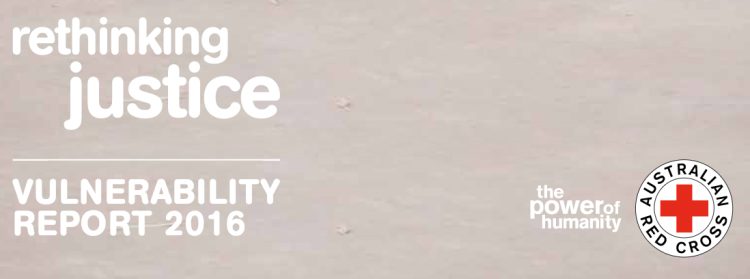The Australian Red Cross has joined calls for a shift to justice reinvestment, issuing a major report urging that it be made a national priority and that trials be rolled out nationwide.
The Red Cross Vulnerability Report: Rethinking Justice warned that, with Australia’s prison population reaching a 10-year high and Indigenous people comprising more than a third of those incarcerated, a rethink was needed.
Instead of seeing prison as the common resort to crime, the report called for it to be seen as a last resort, and urged governments to pursue justice reinvestment reforms:
Justice reinvestment invests in people and communities to provide support, treatment and services that address the underlying issues confronting people who commit less serious offences. These issues include homelessness, mental health, deep social exclusion, and poor education and employment histories.
Evidence suggests that it is more efficient and effective to address the causes and thus reduce the need for (and greater cost of) incarceration.
Early indications from trials in Australia suggest that adopting a local justice reinvestment approach will pay bigger long-term dividends than a “tough on crime” approach.
“Our justice system is broken, urgently needs fixing” – CEO Judy Slatyer launching #justicereinvest report https://t.co/Al4bCJ4FkA
— Australian Red Cross (@RedCrossAU) March 31, 2016
Reps from Woorabinda back calls for new way of doing justice #justicereinvest https://t.co/0tu1K6Ce08 pic.twitter.com/6GBhACccKb
— Australian Red Cross (@RedCrossAU) March 31, 2016
There are already successes with #justicereinvestment around Australia – CEO Judy Slatyer on @breakfastnews https://t.co/BPjJb33Fpl
— Australian Red Cross (@RedCrossAU) March 31, 2016
Halting or reducing the prison population would realise savings of between $1.1 billion and $2.3 billion over five years, the Red Cross said.

The pilot program at Cowra (which you can read about in depth here) was one of four trials underway in Australia that were mentioned in the report.
Looking at the prison population, the report noted a typical background of low education, joblessness, mental health issues, cognitive impairment, drug and alcohol use, sexual abuse and family issues.
Prisoners were much more likely to come from disadvantaged or Aboriginal and Torres Strait Islander communities.
In support of its claim that incarceration was ineffective at rehabilitating people or deterring crime, the Red Cross noted:
- 59% of inmates had previously been sentenced to an adult prison
- 77% of Indigenous inmates had previously been sentenced to an adult prison (total imprisonment rate 13x higher than the general population)
- 38% of prisoners are reincarcerated within 2 years of release
- many reoffend within their first three weeks of liberty

Outlining priorities for governments through COAG’s Law Crime and Community Safety Council, the Red Cross urged:
- establishment of systems to provide more robust understanding of the financial costs of crime, justice and imprisonment
- geographic mapping of vulnerable areas where justice reinvestment may be an appropriate alternative
- national research framework and strategic agenda including longitudinal evaluation of justice reinvestment trials
- a national justice reinvestment information clearinghouse
- public education campaign to support balanced information and perceptions of crime and justice issues within the community
Implementation of the reforms — which the report acknowledged remained controversial for a number of reasons — would require bipartisanship, strong leadership, early identification of important stakeholders, substantial buy-in from all sectors, effective community engagement and ongoing commitment to implementation, the Red Cross said.
We’d encourage you to read the full report, and join the conversation online at #JustJustice or #justicereinvest.








